 Petzlover
Petzlover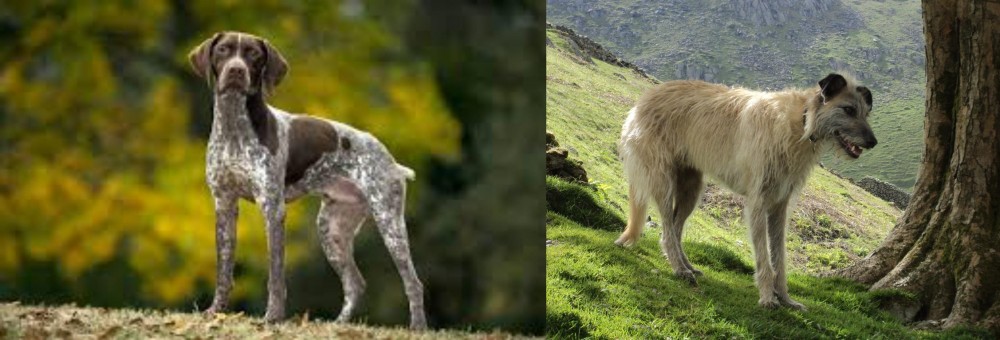 Braque Francais (Gascogne Type) is originated from France but Lurcher is originated from United Kingdom. Braque Francais (Gascogne Type) may grow 6 cm / 2 inches shorter than Lurcher. Both Braque Francais (Gascogne Type) and Lurcher are of same weight. Both Braque Francais (Gascogne Type) and Lurcher has same life span. Both Braque Francais (Gascogne Type) and Lurcher has almost same litter size. Both Braque Francais (Gascogne Type) and Lurcher requires Low Maintenance.
Braque Francais (Gascogne Type) is originated from France but Lurcher is originated from United Kingdom. Braque Francais (Gascogne Type) may grow 6 cm / 2 inches shorter than Lurcher. Both Braque Francais (Gascogne Type) and Lurcher are of same weight. Both Braque Francais (Gascogne Type) and Lurcher has same life span. Both Braque Francais (Gascogne Type) and Lurcher has almost same litter size. Both Braque Francais (Gascogne Type) and Lurcher requires Low Maintenance.
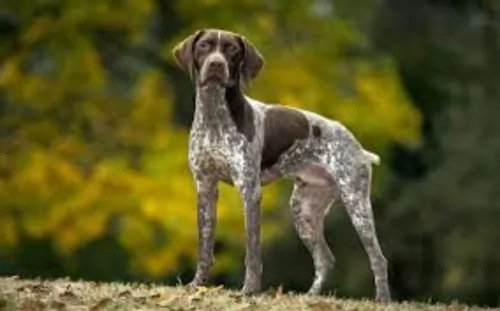 The Braques Français – Gascogne – is a hunting dog from southern France’s Gascony region. Known also as the French Gascony Pointer, this dog has descended from Spanish and Italian Pointers. The dog was saved from extinction at the turn of the 20th century.
The Braques Français – Gascogne – is a hunting dog from southern France’s Gascony region. Known also as the French Gascony Pointer, this dog has descended from Spanish and Italian Pointers. The dog was saved from extinction at the turn of the 20th century.
There are actually two breeds of Braque français, with the other being somewhat smaller and known as Braque français, type Pyrénées. Whichever one you have, they are popular hunting dogs in France. The first breed club was established in 1850.
 The Lurcher is a crossbreed dog that doesn’t seem to have too much certainty around it. There are stories that Lurchers may have been bred to produce a sighthound with more intelligence for hunting.
The Lurcher is a crossbreed dog that doesn’t seem to have too much certainty around it. There are stories that Lurchers may have been bred to produce a sighthound with more intelligence for hunting.
Hunters discovered that breeding certain breeds with sight-hounds produced a dog better suited for hunting and working purpose.
A Lurcher is a sighthound, a classic working crossbreed and some of the dogs used to bring about this breed were Greyhounds, Deerhounds, Whippets, Border Collies, Bedlington Terriers and Irish Wofhounds among others. This means that the Lurcher has many different looks as well. In the UK, Lurchers have their own shows, but no registry recognizes the dog.
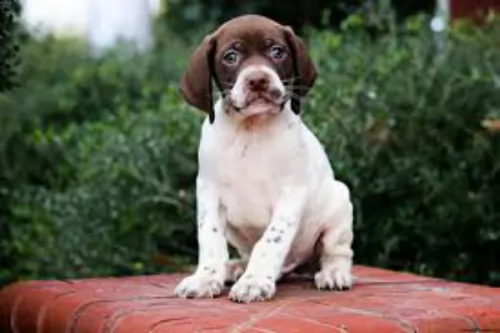 The Braque Francais is a dog which looks much like the German Short-haired Pointer. The Braque Francais (Gascogne) is a large breed dog, standing roughly 56 – 69cm. Weight is most times dependent on height, but the average weighs between 35 and 55 pounds. The dog is attractively lean and muscular and the tails have always been docked, although rules and regulations see the breed with a long tail these days. The natural tail of the Braque Francais is medium length. The eyes of this breed are brown or yellow and the ears are medium in length and floppy. The coat of the Gascogne is short and dense and in two colors – white and chestnut patching and mottling.
The Braque Francais is a dog which looks much like the German Short-haired Pointer. The Braque Francais (Gascogne) is a large breed dog, standing roughly 56 – 69cm. Weight is most times dependent on height, but the average weighs between 35 and 55 pounds. The dog is attractively lean and muscular and the tails have always been docked, although rules and regulations see the breed with a long tail these days. The natural tail of the Braque Francais is medium length. The eyes of this breed are brown or yellow and the ears are medium in length and floppy. The coat of the Gascogne is short and dense and in two colors – white and chestnut patching and mottling.
The dog is a keen tracker and is an excellent game and gun dog with some of them requiring more training than others. Training and socialization makes the Braque Francais an excellent, obedient pet who is eager to please and he is considered to be easily trainable, learning quickly. He loves his human family and is noted for his gentle, friendly nature, and he therefore makes and excellent family pet where there are children and other pets.
 It is difficult to put a size and weight to the Lurcher, This is because of the many dogs used in his development, so that they vary in size and coat type. Generally though, he is a deep chested dog that stands roughly between 50 – 75cm and weighs 25 – 32kg.
It is difficult to put a size and weight to the Lurcher, This is because of the many dogs used in his development, so that they vary in size and coat type. Generally though, he is a deep chested dog that stands roughly between 50 – 75cm and weighs 25 – 32kg.
However, because Whippet was a dog used in his development, he could be as small as a Whippet, the size of a Greyhound or Deerhound.
Generally he has a shortish coat. Colours of the coat vary greatly so you can find fawn, cream, white, grey, black, tan, silver or grey and bi-colored. The ears are usually small and can be floppy or held erect or back and the tail is usually long.
The Lurcher’s temperament is much like that of the sighthound – loving and calm. It is a good idea to have the Lurcher trained and socialized to help prevent both timidity or aggression.
He is an independent and intelligent dog and can be easily trained. He is a gentle dog and will get on well with children and pets in the home as he is a fairly relaxed breed with a quiet temperament, loving to spend time with his human family. Another advantage is that he is low maintenance and makes a great pet when shown love and care.
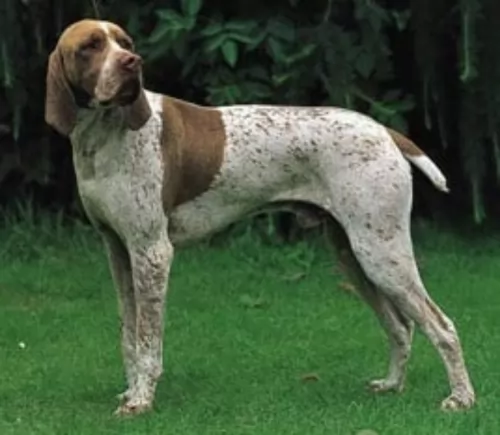 The attractive Braque Francais is a calm, contented dog who is also affectionate, social and intelligent. He is already a well mannered dog but will do even better with training and socialization. However, Braque Francais don’t take well to aggressive training and done the wrong way, the dog can end up being timid and confused.
The attractive Braque Francais is a calm, contented dog who is also affectionate, social and intelligent. He is already a well mannered dog but will do even better with training and socialization. However, Braque Francais don’t take well to aggressive training and done the wrong way, the dog can end up being timid and confused.
Wanting to please and being an intelligent dog, training should be fun, lighthearted but firm. In exchange you’re going to have an awesome friend from this wonderful, loving dog breed.
 The Lurcher is a working- and hunting dog that won’t do well in the city, as he requires large spaces to run.
The Lurcher is a working- and hunting dog that won’t do well in the city, as he requires large spaces to run.
He is a dog that will need you to provide him with games and other activities as well as a walk every day to keep him fit and lithe. He will therefore require an owner who loves to be active and who is consistent, firm, fair, patient and kind.
With the right human family, the Lurcher is a loving, devoted dog who will make an excellent family pet.
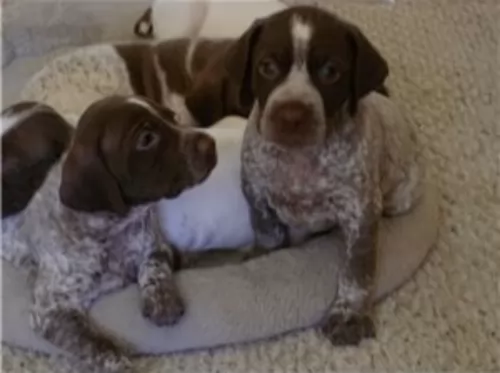 You won’t find many health issues with this active breed but nonetheless hip and joint issues will need to be watched. If you are considering a Braque Français puppy, you’ll want to be selective in choosing a responsible breeder. A healthy puppy with the right environment, can get to up to 15 years of age.
You won’t find many health issues with this active breed but nonetheless hip and joint issues will need to be watched. If you are considering a Braque Français puppy, you’ll want to be selective in choosing a responsible breeder. A healthy puppy with the right environment, can get to up to 15 years of age.
Ectropion and entropion in dogs affect their eyelids. Ectropion is where the eyelids roll outward, whereas entropion is where the eyelids curve inward, irritating the eye. Because visual and skeletal problems occur in this breed, it can be recommended that owners have their pets tested by both the Canine Eye Registration Foundation as well as the Orthopedic Foundation for Animals.
 Every dog has the potential to develop genetic health problems, but the way you feed a dog and look after it will play a huge role in his wellbeing.
Every dog has the potential to develop genetic health problems, but the way you feed a dog and look after it will play a huge role in his wellbeing.
Lurchers are looked upon as being a pretty healthy dog breed and they can be with you for between 10 and 15 years.
Some of the main health concerns with this dog would be bloat, ear- and eye infections or heatstroke.
Remember that if you’re getting a new puppy, you can prevent some of the major life-threatening diseases by having your puppy vaccinated.
Dogs pant heavily when they’re hot. When the panting isn’t enough, the dog’s body temperature rises and this can be fatal for your pet.
The signs of heatstroke in dogs include vomiting, diarrhea, dullness and loss of consciousness. Being locked in a hot car, being over-exercised or left in a yard without shade and water can bring on heatstroke.
It is imperative to remove the dog from the hot place immediately and cool him down by spraying cold water gently over him while making sure no water enters the mouth or nose. Get him to the vet if you can because of shock and the fact that other problems could have developed.
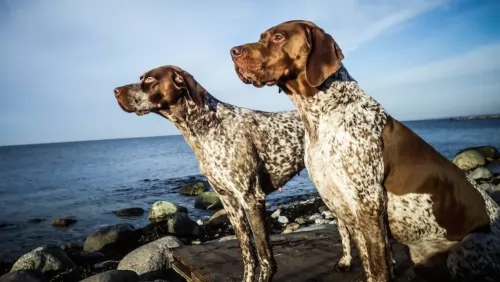 Brushing the coat twice a week will get rid of loose hairs and maintain the sheen of the coat. Also, as a floppy eared breed, attention should be given to the ears to prevent infections. He will also need to have his teeth brushed with dog toothpaste and brush to prevent the build-up of damaging plaque and his nails will also require a clipping if they don’t manage to wear down naturally.
Brushing the coat twice a week will get rid of loose hairs and maintain the sheen of the coat. Also, as a floppy eared breed, attention should be given to the ears to prevent infections. He will also need to have his teeth brushed with dog toothpaste and brush to prevent the build-up of damaging plaque and his nails will also require a clipping if they don’t manage to wear down naturally.
Daily activity will be needed for this dog and he will want a walk every day. He certainly isn’t a dog you can leave indoors or outside in your backyard day after day. Any activities that require physical exertion will be good because they are exceptional athletes. If you are a cyclist or a runner, take him with you – he’ll love it.
Your Braque Francais loves energetic activities and for this he will require an excellent nutrient-rich diet. Nutrient-rich dog foods are higher in protein and fat and lower in carbohydrates. It’s important to check out the carbohydrate content in commercial dog foods to avoid those one high in carbohydrates.
Your vet can always advise you on a good quality food and you can always give him your own home-prepared foods which include rice, vegetables and meat. Certainly include some raw meat into his diet every now and then to avoid skin problems. Fresh, cool water must be available to him night and day.
 Brush your pet’s coat at least twice a week.
Brush your pet’s coat at least twice a week.
The Lurcher just loves to run and be free, so this is a dog that will want a long walk every day.
Check his eyes and inside his ears for ear infection. Find out how to clean inside the ears and make sure they are kept dry.
Keep his nails clipped, as long nails can hook and cause painful injury to the paw area. Check his teeth too and brush them because dental disease is the root cause of many other diseases.
Make sure your dog has a comfy, dry, warm place to sleep.
Encourage health and longevity by giving your pet high quality food full of vitamins and minerals. If you’re going be giving him commercially manufactured food, make sure its one of the better ones. Try and add in homemade food such as boiled chicken, brown rice and vegetables and add this to his kibble as a tasty treat. Some raw meat added in when you can afford it will also be to his advantage.